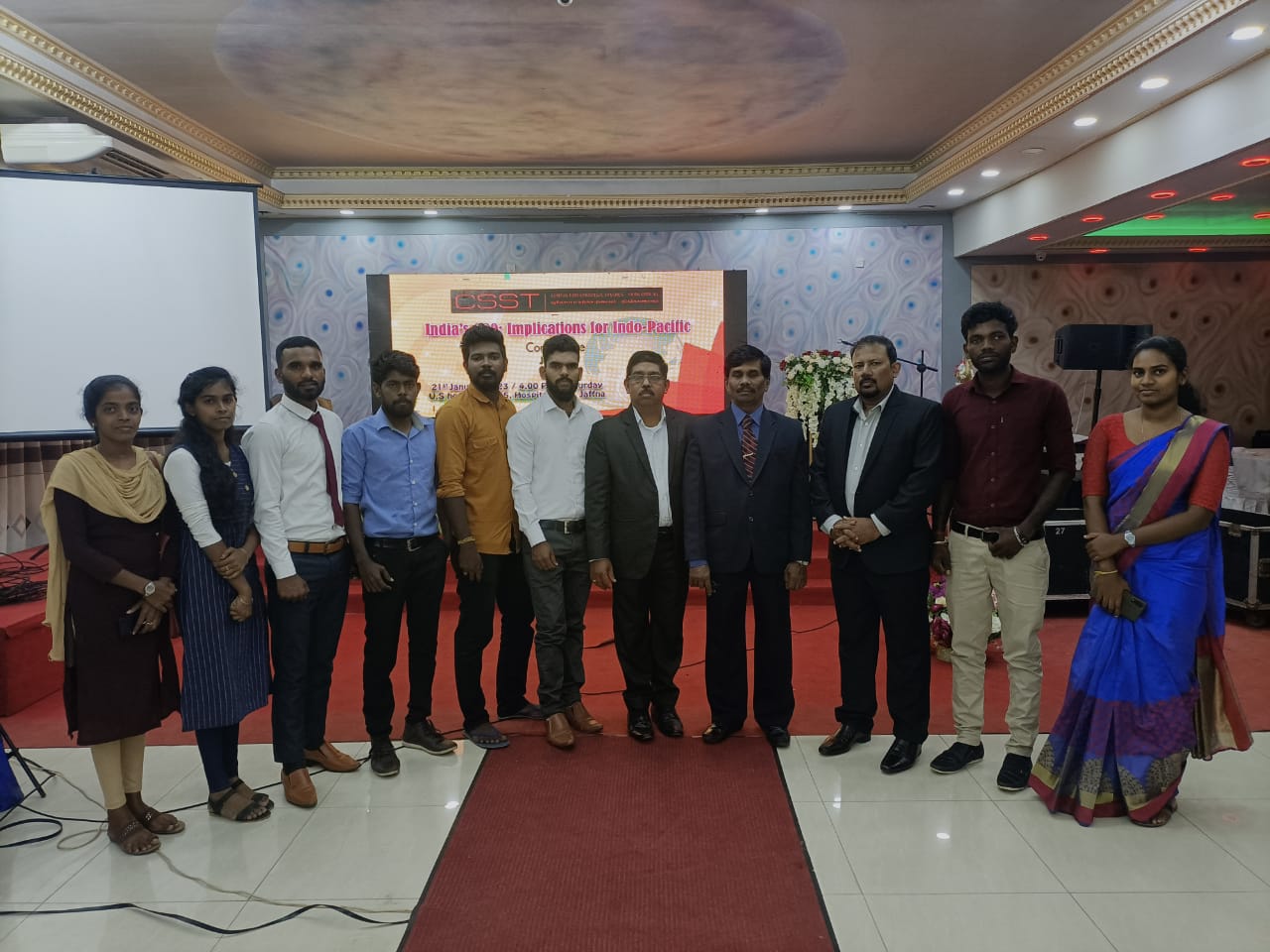India last month began its year-long presidency of the most powerful grouping, the G20. It is a watershed movement for India and South Asia. Against this backdrop, the Center for Strategic Studies – Trincomalee (CSST) organized a conference on ‘India’s G20: Implications for the Indo-Pacific’ in Jaffna on 21 January.
Mr A. Natarajan, Former Consul-General of India in Jaffna, Dr. Jehan Perera, Executive Director at the National Peace Council of Sri Lanka, Commodore (Ret) Seshadri Vasan, Director of Chennai Centre for China Studies and Regional Director of National Maritime Foundation in Tamil Nadu, Mr T.Ramakrishnan, Journalist Chennai and, Prof K.T.Ganesalingam, Department of Political Science, University of Jaffna were joined as keynote speakers. Dr.Siriganesan, English department at the University of Jaffna, moderated the event
The topics discussed in this conference – India’s G20 presidency: Opportunities & Advantages for Sri Lanka in 2023, India’s G20 Presidency: Indo-Pacific consequence, India’s G20 Presidency: Opportunities for crisis-hit Sri Lanka, India’s G-20: Implications on its neighborhood first policy and, India’s G20 presidency: What does it mean to Sri Lanka?
The topics discussed in this conference – India’s G20 presidency: Opportunities & Advantages for Sri Lanka in 2023, India’s G20 Presidency: Indo-Pacific consequence, India’s G20 Presidency: Opportunities for crisis-hit Sri Lanka, India’s G-20: Implications on its neighborhood first policy and, India’s G20 presidency: What does it mean to Sri Lanka?
In his opening remarks, A. Jathindra, Executive Director at CSST, stated that India is the big brother of the region and everything that happens within the sphere of influence of the big brother is important to us. We cannot avoid it and try to escape this responsibility. Strategically, India assumes leadership in the Indo-Pacific region for the first time. During US President Clinton’s visit to India, he mentioned that ‘India is a leader’. It has now been proven. As India is the world’s largest democracy and Asia’s only democratic power, India has an opportunity to act as a connector to the world. Also, he said this could be India’s first G20-based summit in Sri Lanka. This may be the first conference in the neighboring countries.
Prof.P.Balasundrampillai, Emeritus Professor and former Vice-Chancellor, University of Jaffna, stated that India is our neighboring country therefore, we can get benefit immensely. We can consider two things under India’s G20 presidency as a neighboring country; One is an opportunity for the host country to invite two countries along with G20, and the second is South Asia will get a new image with India’s G20 presidency.
Mr. A. Natarajan pointed out that after the end of the internal conflict, India proactively engaged in the overall development of the island nation. Besides politics, India helps Sri Lanka in many ways, including infrastructure, education, culture, welfare, science and sports. Furthermore, he stated opportunities for connectivity between India and Sri Lanka, particularly between south India. Under India’s G20, Sri Lanka may seek assistance from India. He further noted that Sri Lanka should reschedule its economic development plans, and Sri Lanka may also use this as an opportunity to seek assistance from G20 member countries.
Dr.Jehan Perea stated that we are grateful for the assistance of India for Sri Lanka. As an island nation, the problem is in the south, and we have insular thinking about India; most of them do not know about India and Tamil Nadu because lack of exposure to India and Tamil Nadu, but people in Jaffna have links with Tamil Nadu and, they do not have such an island mentality.
India’s G20 presidency can do a lot for Sri Lanka, and India is the biggest donor to Sri Lanka in the movement. India has given economic support timely for sustaining our country. Not only the economic terms and also politically, but India can also assist us. Indian modal of regional autonomy can help us to solve our problem.
Mr. T. Ramakrishnan stated that it is difficult to predict the political and economic consequences of recent developments in Sri Lanka. However, based on their existing bilateral relations, Sri Lanka can benefit from India’s G20 leadership. India has involving cross border energy trade. In this context, Sri Lanka can benefit, especially through electricity projects, and connectivity between countries is essential to boost the Sri Lankan economy.
Commodore S.Vasan pointed out that the government of India, in the last ten years, emphasized its neighborhood-first policy, which means a stable, secure and prosperous neighborhood. In this context, India has been supported by Sri Lanka continually; Sri Lanka can benefit from India’s G20 presidency. Sri Lanka can benefit from India: Three ‘C’, Commerce, Connectivity and Culture and he further noted that Sri Lanka should carefully choose its partners when planning economic projects. Sri Lanka needs to restructure its entire economic platform that you have and should know the strength and weaknesses of its partners.


